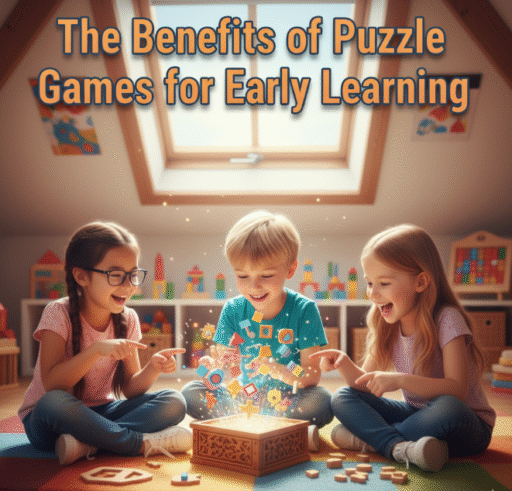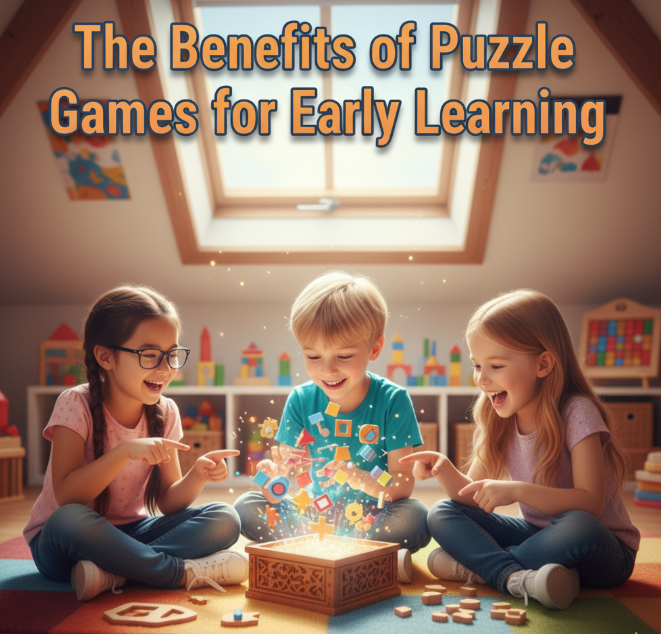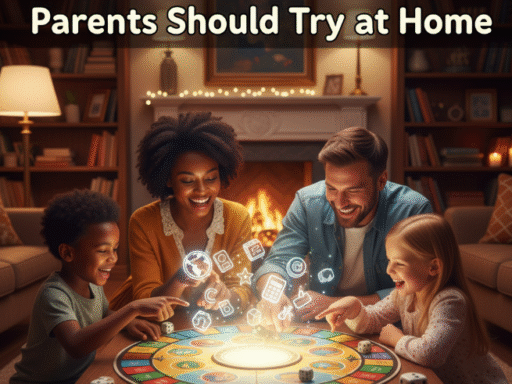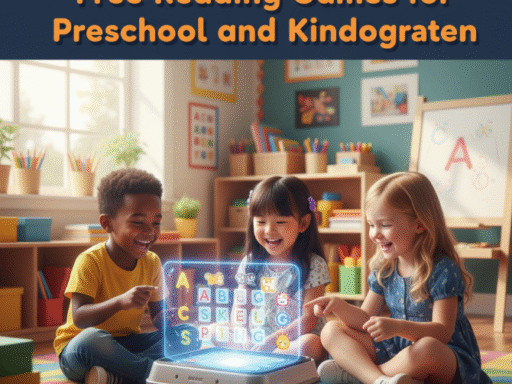Introduction
Every parent wants their child to grow smarter, sharper, and more confident while still having fun. One of the best ways to achieve this balance is through puzzle games. Unlike toys that only entertain for a short while, puzzle games challenge a child’s brain, improve focus, and strengthen essential life skills. Whether it’s a colorful jigsaw, a matching game, or even digital puzzle apps, these simple activities play a powerful role in early learning.
In this article, we’ll explore how puzzle games help children develop problem-solving, critical thinking, memory, and social skills. We’ll also look at the different types of puzzles suited for different ages, practical tips for parents, and why puzzle play is more than just fun—it’s brain-building magic.
Why Puzzle Games Are Perfect for Early Learning
Puzzle games are more than just pieces fitting together. They are learning tools disguised as play. Early childhood is the most critical period for brain development, and puzzles provide opportunities for hands-on learning.
Here’s why they stand out:
-
They stimulate both sides of the brain: logic (left) and creativity (right).
-
They teach patience and persistence—skills children carry throughout life.
-
They combine fun with education, making learning natural and effortless.
Key Benefits of Puzzle Games for Children
1. Boosts Cognitive Development
Puzzle games challenge children to think, plan, and reason. Each piece or step forces the brain to connect information, improving critical thinking and decision-making.
Examples of skills developed:
-
Recognizing shapes and patterns
-
Understanding cause-and-effect
-
Strengthening problem-solving strategies
🧩 For instance, when a child rotates a puzzle piece to make it fit, they’re not just playing—they’re developing spatial reasoning and analytical skills.
2. Enhances Memory and Concentration
Puzzle games require children to recall patterns, remember piece locations, and stay focused until the puzzle is complete. This strengthens short-term and long-term memory.
How puzzles improve memory:
-
Matching games train children to remember object positions.
-
Sequence puzzles teach ordering and recall.
-
Complex puzzles build attention span over time.
📊 Chart: Puzzle Games vs. Memory Skills
| Puzzle Type | Memory Skill Strengthened | Example Activity |
|---|---|---|
| Matching Cards | Short-term recall | Memory card flip game |
| Jigsaw Puzzles | Spatial memory & concentration | 50-piece animal puzzle |
| Sequence Puzzles | Ordering & logical recall | Alphabet puzzle |
3. Improves Fine Motor Skills
When children pick up, twist, and place puzzle pieces, they strengthen hand muscles and improve hand-eye coordination. This is especially helpful for skills like writing, drawing, and using tools.
Examples of fine motor benefits:
-
Strengthens pincer grip (holding small objects)
-
Improves coordination between hand and vision
-
Prepares children for writing readiness
4. Develops Language and Communication Skills
Puzzle games often encourage conversations between children and parents. When kids ask for help or describe a piece, they expand their vocabulary and communication skills.
Language benefits include:
-
Learning new words (shapes, colors, animals, letters)
-
Practicing descriptive language (“This piece looks like the sky!”)
-
Improving storytelling by explaining the puzzle picture
💡 Tip: Choose puzzles with themes like animals, transport, or alphabets to promote word learning naturally.
5. Encourages Problem-Solving and Logical Thinking
Every puzzle is a problem waiting to be solved. Children must test ideas, try different methods, and learn from mistakes. This builds resilience and logical reasoning.
Key problem-solving lessons learned:
-
Trial and error is part of learning.
-
Persistence pays off.
-
Every challenge has multiple approaches.
6. Strengthens Social and Emotional Skills
Puzzle play isn’t always solitary—it can be cooperative. When children solve puzzles with parents, siblings, or friends, they develop teamwork, patience, and sharing.
Social skills puzzles promote:
-
Turn-taking
-
Negotiation and compromise
-
Celebrating shared success
7. Builds Confidence and Self-Esteem
Completing a puzzle gives children a sense of accomplishment. This success boosts confidence and motivates them to take on bigger challenges.
✨ Imagine the pride on a child’s face after finishing their first 100-piece jigsaw—that confidence becomes fuel for future learning.
Different Types of Puzzle Games and Their Benefits
Not all puzzles are the same. Each type contributes differently to early learning.
1. Jigsaw Puzzles
-
Teaches spatial awareness and pattern recognition
-
Encourages patience and focus
-
Great for visual learners
2. Matching & Memory Games
-
Boosts short-term memory
-
Enhances concentration
-
Teaches children to pay attention to detail
3. Shape and Block Puzzles
-
Improves hand-eye coordination
-
Introduces geometry basics
-
Enhances creativity through free play
4. Word and Alphabet Puzzles
-
Strengthens language and literacy
-
Helps with letter recognition and phonics
-
Improves spelling and vocabulary
5. Number and Math Puzzles
-
Develops number recognition
-
Builds early math concepts like addition and subtraction
-
Encourages logical sequencing
📌 Table: Puzzle Types and Learning Focus
| Puzzle Type | Age Group (Suggested) | Main Learning Focus | Example Puzzle |
|---|---|---|---|
| Jigsaw Puzzles | 3–7 years | Spatial reasoning, patience | Animal jigsaw puzzle |
| Memory Games | 4–8 years | Recall, focus | Card flip memory game |
| Block Puzzles | 2–5 years | Coordination, creativity | Wooden shape sorter |
| Alphabet Puzzles | 3–6 years | Language, phonics | Alphabet board puzzle |
| Number Puzzles | 4–8 years | Math basics, sequencing | Number sequencing puzzle |
Practical Tips for Parents to Use Puzzle Games Effectively
Puzzle games are powerful, but parents play a key role in maximizing their benefits.
1. Choose Age-Appropriate Puzzles
-
Toddlers: Large wooden block puzzles
-
Preschoolers: Simple jigsaw puzzles with 10–20 pieces
-
School-aged kids: More complex puzzles (50+ pieces, word games, number puzzles)
2. Create a Puzzle-Friendly Environment
-
Provide a flat, clean surface
-
Keep puzzles organized in boxes or trays
-
Allow quiet time for focus
3. Encourage, Don’t Solve for Them
-
Offer hints instead of answers
-
Let them try and fail before stepping in
-
Praise effort, not just results
4. Mix Traditional and Digital Puzzles
-
Wooden and cardboard puzzles build motor skills
-
Digital puzzle apps improve adaptability and modern learning
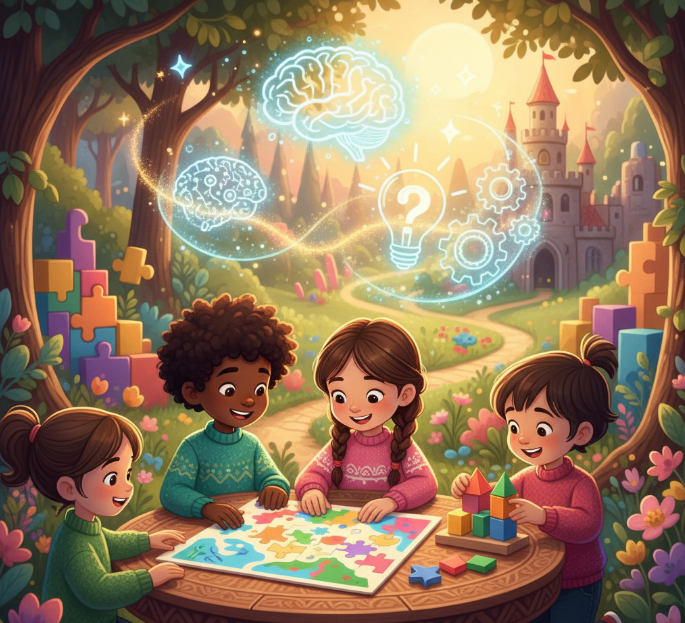
The Benefits of Puzzle Games for Early Learning
Puzzle Games vs. Other Learning Tools
| Feature/Skill | Puzzle Games | Flashcards | Worksheets | Digital Apps |
|---|---|---|---|---|
| Fun & Engagement | ⭐⭐⭐⭐⭐ | ⭐⭐⭐ | ⭐⭐ | ⭐⭐⭐⭐ |
| Problem-Solving | ⭐⭐⭐⭐⭐ | ⭐ | ⭐⭐ | ⭐⭐⭐⭐ |
| Motor Skill Development | ⭐⭐⭐⭐ | ⭐ | ⭐⭐ | ⭐⭐ |
| Memory & Focus | ⭐⭐⭐⭐ | ⭐⭐⭐⭐ | ⭐⭐⭐ | ⭐⭐⭐⭐ |
| Social Interaction | ⭐⭐⭐⭐ | ⭐⭐ | ⭐ | ⭐⭐⭐ |
This comparison shows why puzzle games strike the perfect balance between fun and education.
Long-Term Advantages of Puzzle Play
Puzzle games don’t just benefit children in early learning stages; they also provide life-long skills.
-
Better academic performance in subjects like math and reading
-
Stronger focus and persistence in schoolwork
-
Improved teamwork skills for group projects
-
Greater emotional regulation and patience
🌟 In simple words, puzzles create children who are not only smarter but also more adaptable and confident.
Conclusion
Puzzle games are much more than a rainy-day activity—they’re a cornerstone of early childhood development. From building memory and problem-solving skills to boosting confidence and language, puzzles prepare children for success in school and beyond.
For parents, investing time in puzzle play means investing in their child’s future learning, creativity, and resilience. Whether it’s a simple wooden block puzzle or a digital brain-teaser, the benefits are endless.
So next time your child asks to play, hand them a puzzle—you’ll be giving them a gift that goes far beyond fun.
